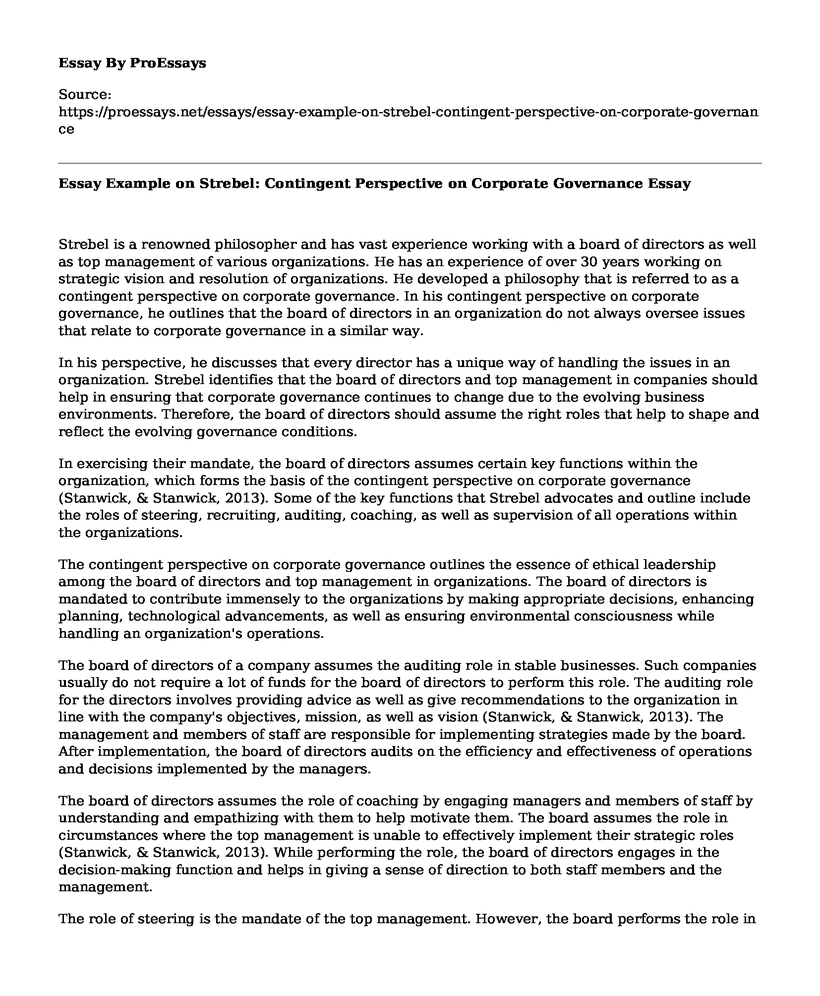Strebel is a renowned philosopher and has vast experience working with a board of directors as well as top management of various organizations. He has an experience of over 30 years working on strategic vision and resolution of organizations. He developed a philosophy that is referred to as a contingent perspective on corporate governance. In his contingent perspective on corporate governance, he outlines that the board of directors in an organization do not always oversee issues that relate to corporate governance in a similar way.
In his perspective, he discusses that every director has a unique way of handling the issues in an organization. Strebel identifies that the board of directors and top management in companies should help in ensuring that corporate governance continues to change due to the evolving business environments. Therefore, the board of directors should assume the right roles that help to shape and reflect the evolving governance conditions.
In exercising their mandate, the board of directors assumes certain key functions within the organization, which forms the basis of the contingent perspective on corporate governance (Stanwick, & Stanwick, 2013). Some of the key functions that Strebel advocates and outline include the roles of steering, recruiting, auditing, coaching, as well as supervision of all operations within the organizations.
The contingent perspective on corporate governance outlines the essence of ethical leadership among the board of directors and top management in organizations. The board of directors is mandated to contribute immensely to the organizations by making appropriate decisions, enhancing planning, technological advancements, as well as ensuring environmental consciousness while handling an organization's operations.
The board of directors of a company assumes the auditing role in stable businesses. Such companies usually do not require a lot of funds for the board of directors to perform this role. The auditing role for the directors involves providing advice as well as give recommendations to the organization in line with the company's objectives, mission, as well as vision (Stanwick, & Stanwick, 2013). The management and members of staff are responsible for implementing strategies made by the board. After implementation, the board of directors audits on the efficiency and effectiveness of operations and decisions implemented by the managers.
The board of directors assumes the role of coaching by engaging managers and members of staff by understanding and empathizing with them to help motivate them. The board assumes the role in circumstances where the top management is unable to effectively implement their strategic roles (Stanwick, & Stanwick, 2013). While performing the role, the board of directors engages in the decision-making function and helps in giving a sense of direction to both staff members and the management.
The role of steering is the mandate of the top management. However, the board performs the role in instances where the firm is faced with externalities that are likely to impact the organization. The board takes up the steering role as a way of helping the business to survive. Therefore, in urgent times, the board comes into play to help steer the company to ensure it heads in the right direction.
The board of directors performs the supervisory role when a firm is exposed to the risk of externalities, where they meet managers and members of staff to review their performance (Strebel, 2004). In addition, the supervisory roles include ensuring that deadlines are met as well as monitoring employee productivity.
References
Stanwick, P., & Stanwick, S. D. (2013). Understanding business ethics. Sage. Retrieved from https://books.google.co.ke/books?hl=en&lr=&id=SpPUrOhQ7I4C&oi=fnd&pg=PR1&dq=Understanding+Business+Ethics+3rd+edition+by+Peter+Stanwick+and+Sarah+Stanwick&ots=NHR4FF1LtN&sig=aW28LWys2_ZGvG3SyFdRlSY546s&redir_esc=y#v=onepage&q=Understanding%20Business%20Ethics%203rd%20edition%20by%20Peter%20Stanwick%20and%20Sarah%20Stanwick&f=false
Strebel, P. (2004). The case for contingent governance. MIT Sloan Management Review, 45(2), 59.
Retrieved from https://search.proquest.com/openview/17b98ce54f075e633f1d6c6ab128815f/1?pq-origsite=gscholar&cbl=26142
Cite this page
Essay Example on Strebel: Contingent Perspective on Corporate Governance. (2023, May 17). Retrieved from https://proessays.net/essays/essay-example-on-strebel-contingent-perspective-on-corporate-governance
If you are the original author of this essay and no longer wish to have it published on the ProEssays website, please click below to request its removal:
- Paper Sample: Complexities and Risks that Face Multinational Corporations
- Essay Sample on Unhealthy Relationship at the Workplace
- The Gantt Chart - Paper Example
- Essay Example on COBIT Model: Crucial for Integrated IT Governance
- Paper Example on Six Sigma: Making Better Management Decisions in Marketing & Sales
- Strategies and Steps in Database Security - Paper Example
- Leadership Practices on Nurse Retention - Research Paper Sample







